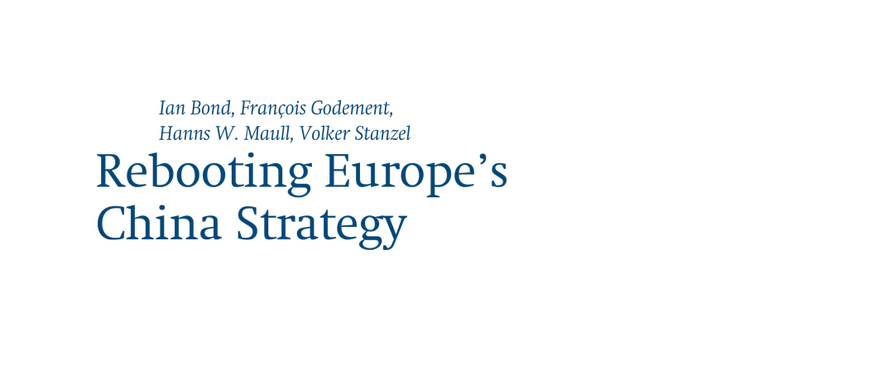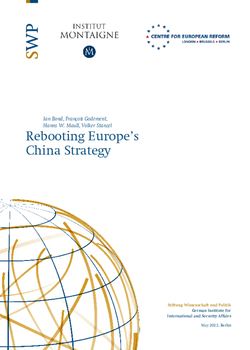
Rebooting Europe’s China Strategy
The following analysis reaches a number of conclusions for the China policy of European countries, whether they are members of the EU or not. The key points are as follows:
- The present assault on the Liberal Democratic International Order, in which China and Russia are openly co-operating, affects the interests of all democratic countries. To respond effectively, Europe first needs a shared understanding of its relationship with China;
- Europe needs to ensure its own comprehensive security, with vulnerabilities ranging from cyberspace, fragile states in its neighbourhood, migratory pressures to military deterrence and defence. Only a Europe confident in its own security can contribute to peace and stability elsewhere, including in the Indo-Pacific;
- While the US is the principal guarantor of the security of both Europe and of America’s partners in the Indo-Pacific, the world’s democratic powers are natural allies and must work together in considering strategies to adapt the international order to the challenge posed by China and by an authoritarian axis between Beijing and Moscow;
- Within that democratic consensus, Europe needs to develop strategies and means that contribute to the Indo-Pacific region’s security;
- In its relationship with China, Europe also needs to reduce its vulnerabilities, enhance its leverage, and engage forcefully with international organisations and multilateral institutions;
- Europe needs to engage with China on the basis of strict reciprocity;
- Europe needs to strengthen collective knowledge about China and its presence in Europe;
- The long-term goal of European China policy must be to support China’s political, social and economic change, which in the past has benefited the Chinese people as well as many of the PRC’s partners.
Introduction
The People’s Republic of China poses an immense challenge for the European Union, one unimaginable only a few years ago. This challenge comes at a particularly difficult time.
Vladimir Putin’s attack on Ukraine has shattered post-Cold War assumptions about the pan-European security order. The COVID-19 pandemic is still raging, imposing very real social and economic costs on European countries. Europe’s security interests are threatened in Eastern Europe, the Middle East and Africa. The consequences of Brexit have not been entirely digested yet, though the war in Ukraine is forcing London and Brussels to work together more closely on sanctions and other aspects of foreign and security policy. Within the Union, illiberal and populist governments are questioning its founding principles. Against the background of this multiplicity of challenges, the EU sometimes struggles to assert itself globally, even though it is still the largest economic and trade entity in the world.
China poses a challenge to Europe’s long-term economic sustainability, to its political freedom to act internationally, to its values and interests and, ultimately, to its security. This is not only a direct challenge, but one which grows out of China’s systemic impact on the international system.
European-Chinese disputes have been on the rise. In Europe, in the United States and in other democratic market economies, the notion of ‘decoupling’ has gained ground in response to newly-perceived risks in bilateral relations with China – the risk of losing technological leadership and industrial competitiveness to Chinese companies backed by the Chinese state; and the risk of Chinese influence operations undermining liberal values and subverting democratic politics. Decoupling can imply anything from keeping key military or dual technologies out of China’s hands to severing ties that result in economic dependence on China.
China has been doing quite a lot of decoupling for itself, and its economic policies increasingly reflect the imperative of national security. The Chinese leadership has promoted a ‘dual circulation’ strategy to strengthen China’s self-reliance and to insulate it from foreign crises. It is steadily increasing constraints on commerce and capital flows in the name of national security, and is changing the rules of the game for equity investment. Yet China maintains the commercial exchanges with the rest of the world that it deems either essential or profitable. During the global COVID-19 pandemic, the country’s exports have significantly risen, often at the expense of European companies.
Both those strategies of decoupling and dual circulation seem to fly in the face of the powerful forces of globalisation that reflect the explosion of knowledge and technological innovation. Globalisation connects individuals and societies across the globe ever more rapidly, broadly and deeply, and its consequences are more intrusive than ever. The nature of Europe’s interdependence with China, based on integrated industrial supply chains, is different from its dependence on raw materials, and especially fossil fuels, from Russia; the current rupture of most financial and economic links to Russia seems unlikely to be repeated in the case of China. Ties might weaken in certain sensitive areas, but overall European entanglement with China remains dense. Economic incentives will continue to promote this entanglement, while political and strategic concerns seek to contain and curb it. European-Chinese interdependence will be contested politically, and thus trade-offs will have to be made between economic gains, threats to national security and political integrity.
As for China, the Chinese Communist Party’s overriding ambition is to remain in control of China. The Party will do everything it considers necessary to consolidate and enhance its power. If the CCP leadership considers meddling in other nations’ affairs as necessary, it will do so, as it has done in Australia, New Zealand, Europe and even in the United States. Pragmatism persuaded China to open up to globalisation and pushed it towards global interdependence. But concern about the CCP’s hold on power demands that the leadership carefully channel and control the implications of globalisation. Moreover, ‘change through rapprochement’ can work both ways – deepening economic interdependence has changed both China and its partners, including Europe. China can use globalisation against the West. As China’s relative weight grows, it will lessen its own constraints, allowing it to expand its influence abroad. China is now aiming to project itself globally with a toolbox that includes persuasion, coercion and corruption, and cyber action, mixing inducements, blackmail and threats. The depth, scope and range of interference in other countries’ politics will be determined only by the motives and capabilities of the CCP leadership, not by any notions about appropriateness.
How should Europe respond to the challenges of its entanglement with China? That is the central question this paper aims to answer. First, however, we need to clarify whom we mean by ‘Europe’.
Who is ‘Europe’?
For our purposes, Europe includes the European Union institutions, the EU’s member states and also other European countries. Europe’s collective identity is expressed by the EU, but also by any group of European states that act in line with the four core elements of its identity detailed below. Even its most influential member states cannot legitimately claim to represent Europe on their own, however – Europe is a collective endeavour.
Europe will need to base engagement with China on a definition of its values, interests and objectives that is shared among Europeans. Achieving this will require persistent political efforts to prevail against centrifugal tendencies within Europe and attempts by China to undermine a unified European voice. The nature of the European political process by itself favours long-term considerations over short-term ones and prioritises moderation over emotion. This also makes it likely that European positions will be compatible with those of middle power democracies such as Japan, South Korea, Australia or Canada, as well as with those of some ASEAN countries. In that sense, Europe seems well positioned in its ability to build coalitions – a key source of soft power in today’s international relations.
This joint policy paper is published by Institut Montaigne in partnership with the German Institute for International and Security Affairs (SWP) and the Centre for European Reform (CER).
Read full report here

